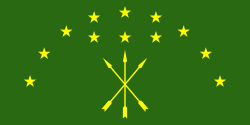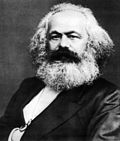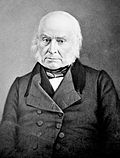
Back Portal:Politik ALS بوابة:السياسة Arabic بوابة:سياسة ARZ Портал:Политика Bulgarian প্রবেশদ্বার:রাজনীতি Bengali/Bangla Portal:Politika BS دەروازە:سیاسەت CKB Portál:Politika Czech Portal:Politik German Portal:Siyaset DIQ
| Main | Topics and categories | Tasks and projects |
The Politics portal
Politics (from Ancient Greek πολιτικά (politiká) 'affairs of the cities') is the set of activities that are associated with making decisions in groups, or other forms of power relations among individuals, such as the distribution of status or resources. The branch of social science that studies politics and government is referred to as political science.
Politics may be used positively in the context of a "political solution" which is compromising and non-violent, or descriptively as "the art or science of government", but the word often also carries a negative connotation. The concept has been defined in various ways, and different approaches have fundamentally differing views on whether it should be used extensively or in a limited way, empirically or normatively, and on whether conflict or co-operation is more essential to it.
A variety of methods are deployed in politics, which include promoting one's own political views among people, negotiation with other political subjects, making laws, and exercising internal and external force, including warfare against adversaries. Politics is exercised on a wide range of social levels, from clans and tribes of traditional societies, through modern local governments, companies and institutions up to sovereign states, to the international level.
In modern states, people often form political parties to represent their ideas. Members of a party often agree to take the same position on many issues and agree to support the same changes to law and the same leaders. An election is usually a competition between different parties.
A political system is a framework which defines acceptable political methods within a society. The history of political thought can be traced back to early antiquity, with seminal works such as Plato's Republic, Aristotle's Politics, Confucius's political manuscripts and Chanakya's Arthashastra. (Full article...)
Selected article
The privilege of peerage is the body of special privileges belonging to members of the British peerage. It is distinct from Parliamentary privilege, which applies to those peers serving in the House of Lords, and members of the House of Commons, during and forty days before and after a Parliamentary session. The privileges have been lost and eroded over time. Only three survived into the 20th century: the right to be tried by other peers of the realm instead of juries of commoners, freedom from arrest in civil (but not criminal) cases, and access to the Sovereign to advise him or her on matters of state. The right to be tried by other peers was abolished in 1948. Legal opinion considers the right of freedom from arrest as obsolete. The remaining privilege was recommended for formal abolition in 1999, and may be retained, arguably, by peers whether members of the House of Lords or not. Peers have other rights that do not formally comprise the privilege of peerage. For example, they are entitled to use coronets and supporters on their achievements of arms.
Featured picture

George John Douglas Campbell, 8th Duke of Argyll KG, KT, PC, FRS, FRSE (30 April 1823 – 24 April 1900), styled Marquess of Lorne until 1847, was a Scottish peer, Liberal politician as well as a writer on science, religion, and the politics of the 19th century.
The sultans of Zanzibar (Arabic: سلاطين زنجبار; Swahili: Sultani wa Zanzibar) were the rulers of the Sultanate of Zanzibar, which was created on 19 October 1856 after the death of Said bin Sultan. He had ruled Oman and Zanzibar as the sultan of Oman since 1804. The sultans of Zanzibar were of a cadet branch of the Al Said Dynasty of Oman.
In 1698, Zanzibar became part of the overseas holdings of Oman, falling under the control of the sultan of Oman. Omani and other Arab traders had already been prominent in trade with the island for hundreds of years. It was also visited by traders from Persia and India, who arrived with the seasonal musim (west wind). Months later they could return east with a change in the wind. (Full article...)
Upon creation, the Northwest Territories were governed by the lieutenant governor of Manitoba, a representative of the federal government and Queen Victoria, for the newly created province of Manitoba. Six years later in 1876, the territory was given its own lieutenant governor, separate from that of Manitoba. These lieutenant governors presided over an assembly with members both elected and appointed by the federal government. Before 1888, the territory required electoral districts with an area of 3,000 km2 (1,200 sq mi) to contain at least 1,000 people. When this quota was met, a by-election was held to elect a member to replace an appointed one. (Full article...)
Selected quote
Selected biography
Cosmo Gordon Lang (1864–1945) was an Anglican prelate who served as Archbishop of York and Archbishop of Canterbury. As Archbishop of Canterbury during the abdication crisis of 1936 he took a strong moral stance, and comments he made in a subsequent broadcast were widely condemned as uncharitable towards the departed king. In his early ministry Lang served in slum parishes in Leeds and Portsmouth before his appointment in 1901 as suffragan Bishop of Stepney in London. In 1908 Lang was nominated Archbishop of York, despite his relatively junior status as a suffragan rather than a diocesan bishop. He entered the House of Lords as a Lord Spiritual and caused consternation in traditionalist circles by speaking and voting against the Lords' proposal to reject David Lloyd George's 1909 "People's Budget". This apparent radicalism was not, however, maintained in later years. At the start of World War I, Lang was heavily criticised for a speech in which he spoke sympathetically of the Kaiser. After the war he supported controversial proposals for the revision of the Book of Common Prayer, but after acceding to Canterbury he took no practical steps to resolve this issue. As Archbishop of Canterbury he presided over the 1930 Lambeth Conference, which gave limited church approval to the use of contraception.
Did you know (auto-generated) -

- ... that Checheyigen's political acumen ensured that her family became one of the most powerful in the Mongol Empire?
- ... that the Chinese Red Army housed its political directorate in a Catholic church in 1935?
- ... that Satrio Sastrodiredjo and Moerachman, both former mayors of Surabaya, Indonesia, were held as political prisoners in the same prison after the 30 September Movement in 1965?
- ... that as part of its strategy of political renovation, National Convergence nominated a librarian to contest one of Bolivia's most competitive legislative districts?
- ... that the 2009 book Where Heaven and Earth Meet introduced the term "Sacred Esplanade" as a politically neutral term for the religious site in Jerusalem known as al-Haram al-Sharif or the Temple Mount?
- ... that a co-founder of Braver Angels designed their Red/Blue political depolarization workshops based on couples therapy?
More did you know...
- ...that the phrase "lipstick on a pig" may have its origins in the 18th-century expression "A hog in armour is still but a hog"?
- ...that the Pirate Party of the United States was formed after a 2006 raid by the Swedish police on the servers of The Pirate Bay, a popular file sharing website?
- ...that Andrey Kirillovich Razumovsky, at the time Ambassador of the Russian Empire to the Austrian Empire, commissioned three string quartets from Beethoven?
- ...that the 1968 pamphlet Is the School House the Proper Place to Teach Raw Sex? claimed that sex education was a Communist conspiracy?
- ...that the American Society of Magazine Editors book The Best American Magazine Writing 2007 features investigative journalism about the Beslan school hostage crisis and survivors of Agent Orange?
- ...that the Libyan opposition has embraced "Zenga Zenga", an Israeli-created auto-tuned song and viral YouTube video that parodies Libyan ruler Muammar Gaddafi (pictured)?
- ...that co-founder of the Saudi Civil and Political Rights Association Mohammed al-Bejadi spent most of 2011 in prison?
- ...that when the Tennessee Center for Policy Research, a "free-market think tank," criticized Al Gore's energy use, CNN mistakenly called the organization an environmental group?
In this month
- April 1, 1979 – Iran's government becomes an Islamic Republic by a 98% vote, overthrowing the Shah officially.
- April 9, 1948 – the period known as La Violencia begins with the assassination of Colombian Liberal Party leader Jorge Eliécer Gaitán. For the next ten years Liberals, Communists and Conservatives would fight each other in the conflict.
- April 9, 2003 – Government of Saddam Hussein overthrown by American forces in Iraq.
- April 19, 2006 – Han Myung-sook becomes South Korea's first female Prime Minister.
- April 24, 2005 – Presidential elections in Togo return Faure Gnassingbe to power two months after he was installed by the military following the death of his father, Gnassingbé Eyadéma.
- April 28, 1937 – Saddam Hussein, the President of Iraq was born.
- April 30, 1945 – Adolf Hitler and his wife Eva Braun, commit suicide as the Red Army approached the Führerbunker in Berlin. Karl Dönitz succeeds Hitler as President of Germany; Joseph Goebbels succeeds Hitler as Chancellor of Germany.
News and Current events
- August 11: 4 local government areas in New South Wales, Australia locked down after COVID-19 case
- August 11: Australia: AstraZeneca vaccine access expanded by Victorian government
- August 1: Australia: Victorian lockdown lifted
- July 29: Tunisia's president dismisses prime minister, suspends parliament
- July 25: Australia: Wikinews interviews Reg Kidd, mayor of the City of Orange, about COVID-19 lockdown and local government
- July 23: South Australia enters week-long lockdown to contain COVID-19 Delta variant spread
- July 21: Technological University Dublin senior lecturer Dr Lorcan Sirr speaks to Wikinews on housing market in Ireland
- July 21: Three rural councils in New South Wales, Australia enter 7-day lockdown
- July 21: Australia: Victoria lockdown extended by a week with 85 active cases recorded
- July 15: California governor signs new state budget, eligible Californians to get stimulus payments
Topics and categories
General images
Related portals
Associated Wikimedia
The following Wikimedia Foundation sister projects provide more on this subject:
-
Commons
Free media repository -
Wikibooks
Free textbooks and manuals -
Wikidata
Free knowledge base -
Wikinews
Free-content news -
Wikiquote
Collection of quotations -
Wikisource
Free-content library -
Wikiversity
Free learning tools -
Wiktionary
Dictionary and thesaurus
























































